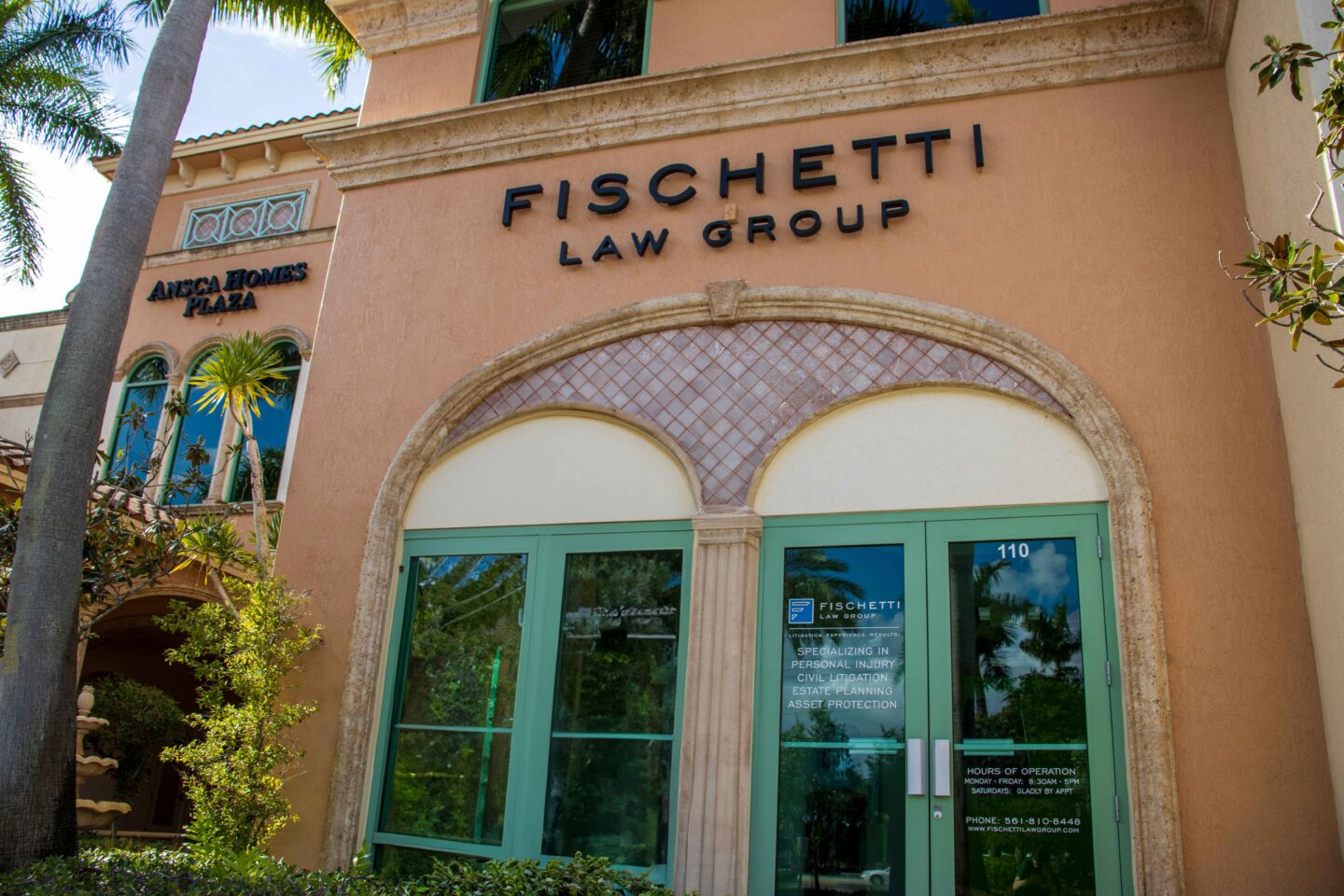Fischetti Law Group: Representing Palm Beach County
If you’ve suffered an auto accident, slip and fall, or any other incident in Palm Beach Florida, make sure that you get yourself a personal injury lawyer who not only cares about their clients, but is also local to the area. The Fischetti Law Group has been based in Palm Beach County since 2009. We work hard to make sure that our clients are fully compensated for their personal injury claim. Call us at 833-MIKE-247 or visit our Contact Page to schedule a FREE consultation.
Personal Injury Cases We See in Palm Beach
Other Services Fischetti Law Group Offers
Who We Are
At Fischetti Law Group, we are dedicated to providing clients with comprehensive legal services, emphasizing a balanced approach, meticulous planning, and expert advice. Our team of specialized litigators collaborates to share insights on personal injury and homeowner's insurance claims, ensuring each case benefits from a collective expertise. This collaborative strategy enables us to pursue personal injury accidents, insurance claims, and estate planning services throughout Florida.
Palm Beach County Cities
Belle Glade
Boca Raton
Boynton Beach
Delray Beach
Greenacres
Jupiter
Lake Worth
Lantana
North Palm Beach
Palm Beach Gardens
Palm Springs
Riviera Beach
Royal Palm Beach
The Acreage
Wellington
West Palm Beach


Personal Injury Statistics in Palm Beach County
Compared to every other county in South Florida, Palm Beach has one of the highest crash rates of any other! Here are some statistics of accidents that occurred in 2023, provided by Florida Highways Safety And Motor Vehicles.
- Total Accidents: 26,246
- Total Crash Injuries: 16,239
- Total Deaths from Accidents: 192
- Total Hit and Run Accidents: 6,953
- Total Bicycle Accidents: 689
- Total Pedestrian Accidents: 713
- Total Pedestrian Deaths: 52
Common Personal Injuries We See in Palm Beach County
The Fischetti Law Group has seen many types of injuries, and while each one varies depending on the nature of the accident, some injuries are more common than others. Here’s a list of some of the most frequent injuries seen in personal injury claims:
- Whiplash and Neck Injuries
- Broken Bones (Fractures)
- Traumatic Brain Injuries (TBI)
- Internal Injuries
- Cuts, Lacerations, and Abrasions
These injuries can have varying levels of severity and often result in costly medical bills, long recovery times, and lasting physical and emotional effects. In personal injury cases, the extent of the injury plays a major role in determining compensation and legal outcomes.
FAQs
1What to do after an Accident in Palm Beach County?
1. Immediately call for medical assistance if needed.
2. Make sure you exchange information with the other person(s) involved (Name, Address, Contact Info, License Plate, and Insurance Info).
3. Document all the injuries you’ve sustained and damage to your vehicle.
4. Collect any witnesses and their contact information if at all possible.
5. Make sure that you contact us, the Fischetti Law Group, to serve as your Palm Beach County personal injury lawyer before you speak to your insurance company, they may try to get you to admit fault for the incident, which could hurt your personal injury claim.
2How Long can I Wait to File a Personal Injury Claim?
In personal injury cases, there is a two-year statue of limitations to file a lawsuit following an accident. After this time period, claims can no longer be pursued.
If you are in an accident then you have to seek medical care within 14 days of the accident to be eligible for PIP coverage. If you fail to seek medical treatment within 14 days then you would have waived your ability to use your statutory PIP benefits. While it's advisable to file your claim as soon as possible, the typical deadline for submission is within 30 days after the accident.
3How Much Will my Personal Injury Claim Compensate me?
While we will always try to get you the best settlement possible, the amount you can earn in your personal injury claim varies based on several different factors.
- • The severity of your injuries and/or vehicle damages
- • Comparative Fault (how much of the accident you are determined to be at fault for)
- • Medical costs or lost wages resulting from the accident
- • How much of the accident your insurance will cover
4What If the Insurance Company Refuses to Pay?
It’s not uncommon that we see insurance companies deny payment, regardless of how much it is needed. Through all the frustration, know that you can trust Michael Fischetti of the Fischetti Law Group to fight the insurance companies and get you the compensation that you deserve. Our law firm is here to help!
5What is a Contingency Agreement?
We offer an initial FREE consultation, We do not charge retainer fees or hourly rates; No out-of-pocket fees while your case is pending; If we recover compensation on your behalf, we only retain our fixed portion. If we do not win, you pay no legal fees.